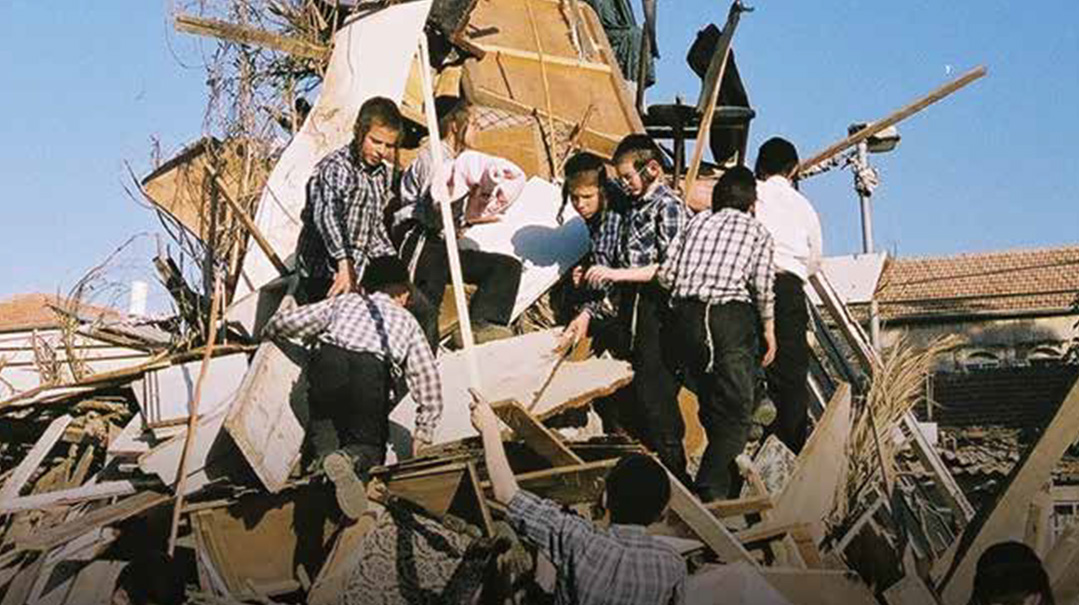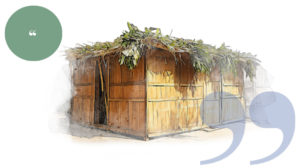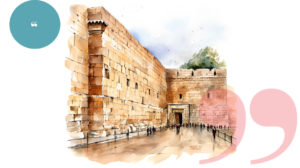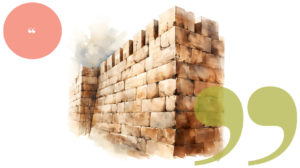A Taste of Utopia
| May 24, 2013They’re preparing the shul’s Lag Ba’Omer bonfire, and their naturally good middos are shining.

Looking out my window, I found the answers to some questions I’ve always wondered about: Why did Lag Ba’Omer put an end to the deaths of Rabi Akiva’s students? Is it a coincidence that they stopped dying on the day that would be Rabi Shimon bar Yochai’s yahrtzeit years later?
On the street below my house, large groups of boys are working in perfect unity. Not a single parent is involved. Their activity creates no mess in the house, doesn’t cost me a penny, and keeps them happy and busy in the fresh air and sunshine. They won’t bother me at all until they come in for dinner, starving and exhausted. They’ll be so hungry they’ll probably eat anything I give them, and they won’t have to be threatened into bed.
It gets even better.
I don’t know where on earth they found that 45-foot klutz (central pole), but I saw six boys working in perfect cooperation for an entire afternoon to transport it. Getting it to stand upright is going to take just as much teamwork, but they’re bound to manage it.
They’re preparing the shul’s Lag Ba’Omer bonfire, and their naturally good middos are shining.
To get a glimpse of how good our children can be when left to their own devices is to get a taste of utopia. It’s fascinating because it’s so unexpected. Nobody has to beg the big boys to take the little ones along with them. No adults are reminding the fifth graders to be nice to the first graders.
There’s a hat with a little bar mitzvah boy under it — he’s showing the younger ones how they can use a pulley to make the job easier. See that boy, the one in the brown striped shirt? The one who’s usually so anxious to prove his superiority? Today he’s not insisting that everyone notice how strong he is. He’s complimenting others on their strength.
That boy by the red car who’s wiping his face on his shirt — he’s always so possessive. But now he’s not insisting on his rights over anything. The short, curly red-headed kid is forever vying for leadership, but not this week.
This week, everyone does what he can, without expecting any special attention. No bribery or status upgrades are needed. Each boy is doing his best, and nobody’s efforts are scorned. Every three-year-old carrying a little bundle of kindling is appreciated and welcome.
One log makes a little fire, big enough to warm you on a cool spring evening. Add more wood, and you get a bonfire immense enough to warm your whole circle of friends. Individuality is good, but teamwork is dynamite.
The man down the block, who drives a pickup truck, is attracted by the spectacle, too. (Aren’t all men boys at heart?) He drove into the forest, let the kids load up the truck with deadwood, and delivered it for them. They didn’t even fight for the right to sit in the truck. The ones who didn’t find a seat just ran up the shortcut to be ready to unload the truck. Nobody shirked. Everyone worked with a will, loading, unloading, and stacking. And when he drove away, mothers didn’t have to prompt them, “What do you say to the nice man?” On their own accord, they all lined up on the sidewalk to wave goodbye and shout, “Todah! Todah rabbah!”
What a tikkun for a plague caused by the lack of respect for fellow Jews!
But where does Rabi Shimon bar Yochai fit in? We know that he rectified the mistake of Rabi Akiva’s students because when he first left his cave he set peoples’ fields ablaze with his critical gaze, but when he emerged again a year later, he was able to appreciate the kedushah of simple Jewish farmers. Besides, would he have had the merit to transmit Rabi Akiva’s Torah after the first students died if he hadn’t rectified their lack of mutual respect?
The enormous bonfire the boys are preparing will be lit on his yahrtzeit to commemorate the intense fire that surrounded him on his deathbed, itself a tribute to the enormous, hidden light of the Torah that he revealed.
Fire turns whatever it touches into fire — it frees its hidden energy. Our challenge on Lag Ba’Omer is to appreciate the potential, sometimes hidden, energy of every person.
The boys I watch from my window have grasped it.
(Originally featured in Family First, Issue 338)
Oops! We could not locate your form.







